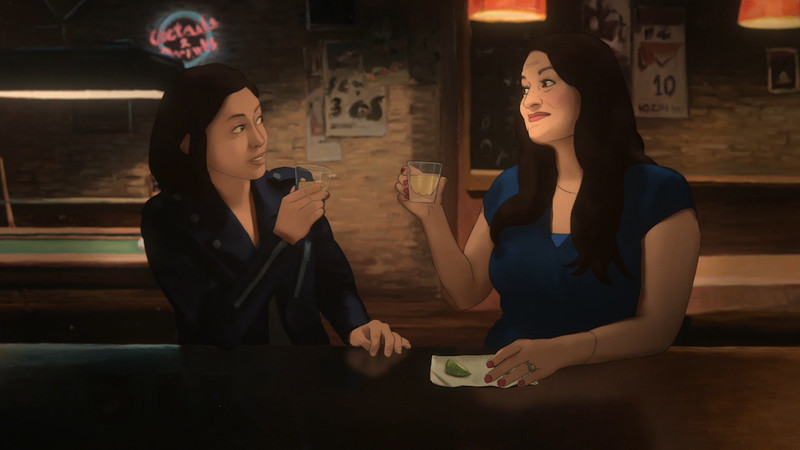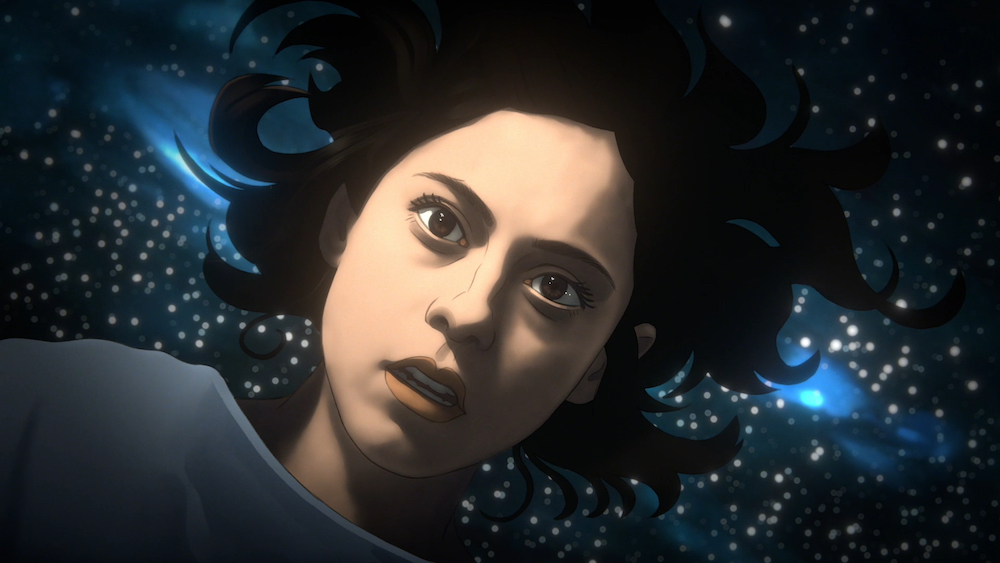Alma’s voice cracks as the sky explodes; her rage peaks as darkness envelops her like a blanket, like paint slowly spilling toward her, and the glass, or stars, or clouds, or ceiling, or walls of her mind shatter and rain down. She sits at her kitchen counter, her dead father breathing at her side, and tries to move keys with her mind. Not her mind, her connection to the universe. Not move the keys, but move the time around the keys. Not tries, but tries not to try. The keys disappear, then reappear as her boyfriend tosses them on the counter where they used to be and will be again. He walks past a piano and tinkles keys of a different sort, casually, tunelessly. Maybe he already has. Maybe he’s about to. Maybe he won’t next time.
To call Amazon’s “Undone” (debuting this Friday, September 13) a breathtaking piece of animation would be both to speak truly and to undervalue its strengths. To call it a complex, rich psychodramedy would be accurate and far from the complete picture. It is both, a perfect marriage of story and style, each half invaluable and impossible to divorce from the other. Attempt to praise what may be Amazon’s best series for either its technical accomplishments or for its narrative power, and you will find yourself praising both. Like Alma’s life, even its contradictions seem to harmonize. An animated series anchored by gripping live-action performances. An intimate character study in which no compass rose exists to tell you what’s real. Grounded. Fantastical. A series worthy of deep examination, but which can be most accurately summed up in two words: Watch it.

Created by Kate Purdy and Raphael Bob-Waksberg of “BoJack Horseman,” “Undone” follows Alma (Rosa Salazar, “Alita: Battle Angel”) as she sleepwalks through life (and sometimes, it seems, through sleep): showering, brushing her teeth, attaching the external portion of her cochlear implant, a dead-eyed commute to the daycare where she works, stilted conversations with her mother (Constance Marie) and sister (Angelique Cabral), comfortable banter with her boyfriend (Siddharth Dhananjay), fights begun and abandoned, a nightly stumble into bed, repeat. Yet that’s not how we meet her. We meet her as she tears down the street in her car, weeping and ignoring all lights and signs. Then she sees a glimmer of something, a familiar man appearing from nowhere, on the side of the road. That’s all it takes to wreck the car and send her life in a new direction—unless it doesn’t.
That glimmer turns out to be her dad, Jacob (Bob Odenkirk), who died in a mysterious accident after abandoning her mid-trick-or-treating as a child. The accident, which he may or may not have caused intentionally, unlocked a piece of her, a piece which allows her to come unstuck in time, to seemingly shift reality. He tells her his death was no accident, and that he needs her help to uncover the truth. She has endless potential, he tells her—like his mother Geraldine before her, whose abilities were perceived as schizophrenia, leading to her spending much of her life in a mental health facility. The story springs from Alma, and her understanding of this experience is also ours (on the rare occasions we see things from someone else’s point of view, it’s because she has as well), which means every fantastic occurrence is presented as true. But is she Geraldine, alarming family and friends with behavior that only looks erratic from the outside? Or is she Geraldine, whose brain chemistry paints a fractured reality?
One could probably tell the story of Alma, a young woman weighed down by grief and fear, with great writing and Salazar’s performance alone. But to tell the story that folds into that one, which collapses and enriches it, imagination and no small amount of technical prowess was required. Enter director Hisko Hulsing, who is also the driving force behind its animation and art. Combining oil painting, 3D animation, 2D animation, and most importantly, rotoscoping—the technique of painting or tracing animation over live-action footage—gives Alma’s world a disorienting but rich texture, uncanny without ever being off-putting. It somehow marries the ache and simplicity of a picture book with the tiny facial expressions that make live performances so rich. Imagine seeing the faces of the 12 little girls in two straight lines of the Madeline books by Ludwig Bemelmans, and knowing that the tightening of their jaws means they’re struggling to keep their emotions in check.

Put plainly, it’s impressive. Hulsing worked with the company Minnow Mountain, which also helped bring to life Richard Linklater’s “A Scanner Darkly,” to create the dreamlike world of “Undone,” which grows increasingly more complex and unsettling in each of the five episodes provided to critics for review. But while there’s much to celebrate in the visual language of the series, its other technical achievements are no less impressive. The quality of the audio changes with Alma’s experience; when she wants to fully retreat inside her mind, she takes the external part of her implant off and we descend into near silence. (“Undone” also handles Alma’s decision to get the cochlear implant with grace and thoughtfulness.) The costuming performs the familiar task of communicating both who the characters are and how they’d like to be seen, but designer Atara Gottschalk also outfits Alma in clothes that, once rotoscoped, seem to become even more loose and shapeless than they are, occasionally distorting her frame in appropriately disorienting ways. And as with another of the best shows of the year, Netflix’s “Russian Doll,” the slight changes in Alma’s repeated tracks prove even more disorienting than the elements that remain the same, forcing the viewer to feel the cost of coming unstuck in time.
And then there’s the keys. This is a series interested in what it’s like to toss your keys on a table that’s no longer there, because your ex moved it out and your body has not yet accepted that fact; it’s interested in the woman who leaves those keys on the floor and then stumbles into the piano, catching herself on the very keys that her lover pressed in the past, or will press in the future. The big ideas and grand accomplishments of “Undone” are well worth lauding, but so are the tiny moments dreamed up by Purdy, Bob-Waksberg, Hulsing. I don’t know if the door keys/piano keys parallel was intentional. I’d like to think it was. But what really matters is that “Undone” creates an experience in which those resonances cannot help but emerge, where you find meaning in everything and question all you uncover. It asks your engagement, and rewards you well for your efforts. And odds are that you, like Alma, will set about reliving it all again.
Five episodes screened for review.












